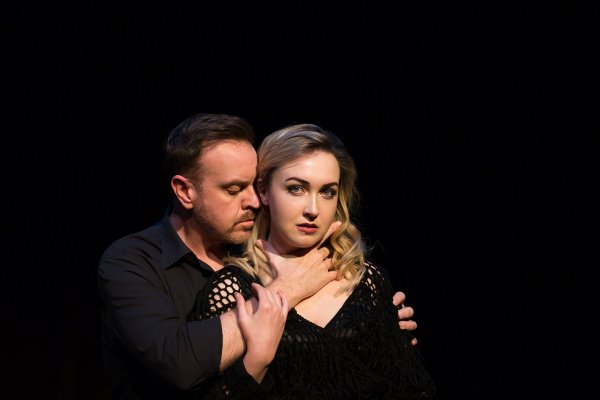There are few living playwrights who exhibit a love and understanding of language like David Ives. Listed as one of the top ten smartest New Yorkers, his play Venus in Fur is one of the most produced contemporary plays, even beating out the Bard in 2014.
The show presents a theatrical challenge to its audience to become more conceptually critical
In Venus in Fur, Ives has created a play in which his central character resists the story and narrative written for her, and simultaneously, other women. The show presents a theatrical challenge to its audience to become more conceptually critical, and to truly consider the implications of the stories we tell, and how we tell them.

David Ives
The play follows Thomas Novachek, a director who has spent the day auditioning actresses for his stage adaptation of the classic novel on sadomasochism by Leopold von Sacher-Masoch. Having rejected them all as unsophisticated and unintelligent, he is caught off guard when Vanda Jordan – who at first glance seem wholly unsuitable for the role – bursts through the door to audition. In doing so, she smashes her way out of the confines of the stereotypes and preconceptions written into the role. She works to bring the character to life, but unlike Pygmalion’s sculpture, refuses to bend to the will of her maker.
This two-hander is a war of the words; Thomas, the playwright/adapter defends his work while sidestepping responsibility for some of the more offensive components; and Vanda, the actress challenges and resists the narrative which has been ambivalently yet deleteriously written for her. While many of the overarching ideas in the play are attributed to Sacher-Masoch, one particular line is consistently attributed to the playwright on stage:
“We are all easily explicable, what we are not is easily extricable.”
And herein lies perhaps the most significant observation of Ives’ play: the inextricability of individuals from the categories they occupy, and their associated narratives. This is one of the main topics of concern in the field of cognitive linguistics.
Put simply, cognitive linguistics examines how the way we talk about things and people affects how we think about and interact with them. When we categorise a person we imbue them with the characteristics of the concept.
In Venus in Fur, the category under examination is ‘woman’, the problematic nature of which has been highlighted by a number of feminist linguists. Monique Wittig for example insisted that men and women are political, rather than natural categories. Given the connection between sex and gender, many find it difficult to understand gender as a category, which is constructed rather than essential. Gender theorist Judith Butler, notable for her significant contribution to this debate, used quotation marks around the terms ‘men’ and ‘women’ in order to denaturalise them and to designate them as sites of political debate.

Venus in Fur stars Craig Alexander as Thomas, and Joanna Richards as Vanda. Image: Shelly Higgs
Martha Minow makes the point that we tend to “treat the categories we use as dictated by the essence of things rather than established by our decision to focus on one trait rather than another”. The same can of course be said for narratives. The play makes references to a number of famous women: Messalina, Pomadour, Borgia, all of whom are haunted by the narrative of the insidious temptress. By naming them Ives’ makes it clear what his protagonist believes about women.
This type of categorisation of course exists outside the play as well. In politics women who demonstrate ambition are labelled Lady Macbeth, and those who adopt resolve that is often seen as natural in men are termed iron ladies. Marie-Antoinette is quick to the lips of anyone who wants to diminish a woman as selfish or indulgent.
Unless the way stories are told about particular categories is actively challenged, it will be difficult to overcome the negative stereotypes attached to the concepts
Throughout history, the way the stories of prominent women have been told has influenced the construction of the category ‘woman’. Unless the way stories are told about particular categories is actively challenged, it will be difficult to overcome the negative stereotypes attached to the concepts. As such, an amelioration of the inextricable narrative attached to the category of ‘woman’ is central to our campaign for gender equality.
**
Make a date with Venus in Fur.
Enjoy an evening at the theatre with colleagues, friends and loved ones at The Street Theatre. Call The Street on 6247 1223 to discuss special prices for large group bookings. Enjoy a meal in City West before the show. After the show, meet the director and cast and carry on the conversation in the foyer or around town.
Direction: Caroline Stacey Cast: Craig Alexander and Joanna Richards Designers: Imogen Keen (Stage and Costumes), Verity Hampson (Lighting), Kyle Sheedy (Sound) Coaches: Dianna Nixon (accents) Emma Strapps (movement)
22 August – 2 September The Street Theatre 15 Childers Street Canberra City West www.thestreet.org.au




